How Professional Indemnity Insurance Shields Your Business?
How General Liability Insurance Protects Your Digital Business
Why Every Company Needs D&O Insurance
Securing Charitable Work: Insurance Solutions for Nonprofits
Securing Sensitive Data: Cyber Insurance for Healthcare Providers
In the realm of healthcare, the security of sensitive data isn’t just about protecting information; it’s about safeguarding human lives. The stakes have never been higher, as the surge in cyberattacks against healthcare organisations presents an alarming threat to patient safety and privacy.
“In the fight against cybercrime, healthcare stands on the frontline, battling threats that endanger both data and lives.”
The Escalating Threat Landscape
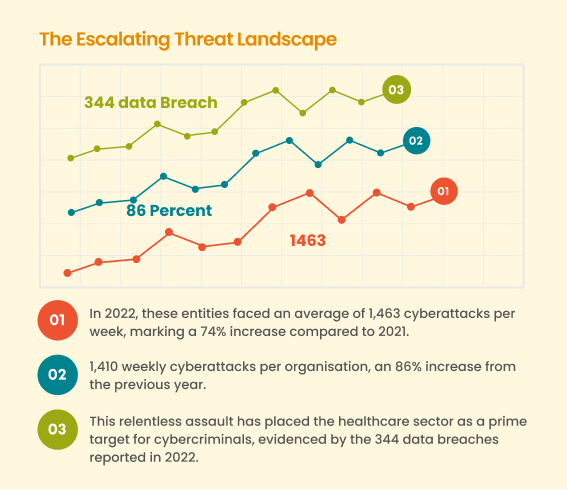
Healthcare organisations worldwide are experiencing an unprecedented wave of cyberattacks. In 2022, these entities faced an average of 1,463 cyberattacks per week, marking a 74% increase compared to 2021. This spike is even more pronounced in the United States, where healthcare organisations were subjected to an average of 1,410 weekly cyberattacks per organisation, an 86% increase from the previous year.
This relentless assault has placed the healthcare sector as a prime target for cybercriminals, evidenced by the 344 data breaches reported in 2022. The compromised data often includes patients’ medical history, treatment details, and medical insurance account numbers, with phishing and ransomware being the most common attack vectors.
The Dire Consequences of Ransomware Attacks
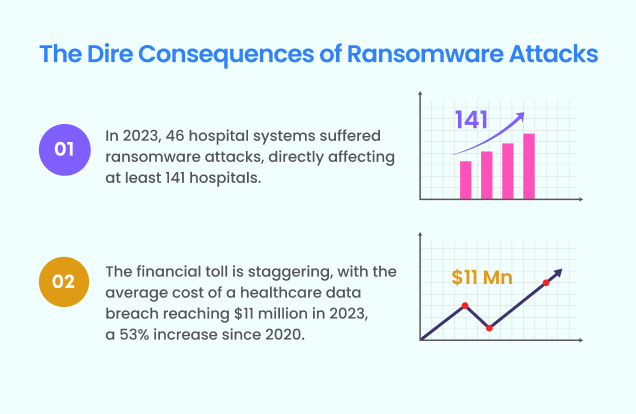 The impact of ransomware attacks on healthcare institutions is profound. In 2023, 46 hospital systems suffered ransomware attacks, directly affecting at least 141 hospitals. These incidents not only disrupt IT systems and patient data access but also force emergency departments to redirect ambulances, causing increased strain on surrounding facilities and negatively impacting patient care. The financial toll is staggering, with the average cost of a healthcare data breach reaching $11 million in 2023, a 53% increase since 2020.
The impact of ransomware attacks on healthcare institutions is profound. In 2023, 46 hospital systems suffered ransomware attacks, directly affecting at least 141 hospitals. These incidents not only disrupt IT systems and patient data access but also force emergency departments to redirect ambulances, causing increased strain on surrounding facilities and negatively impacting patient care. The financial toll is staggering, with the average cost of a healthcare data breach reaching $11 million in 2023, a 53% increase since 2020.
The Critical Role of Cyber Insurance
In this volatile landscape, cyber insurance emerges as an essential safeguard for healthcare providers. It offers a financial safety net that can help cover the costs associated with breaches, including ransom payments, which have seen a dramatic increase in demand, with the average payment rising to around $1.5 million in 2023. However, the challenge remains in the underreporting of ransomware attacks, as many institutions choose not to disclose the specific nature of the cyberattacks they suffer.
The healthcare sector’s battle against cyber threats is ongoing, and while significant strides have been made, such as the shutdown of the Hive ransomware group, the prevalence of attacks continues to rise. As healthcare providers navigate this treacherous terrain, a multifaceted approach encompassing robust cybersecurity measures, comprehensive cyber insurance, and a culture of vigilance is paramount. By drawing lessons from these harrowing experiences, healthcare institutions can fortify their defences, ensuring the safety of their patients’ data and, ultimately, their lives.
As the healthcare sector continues to adapt to the digital age, the rise in cyber threats necessitates an ever-evolving defensive strategy. Healthcare providers must not only focus on strengthening their cybersecurity measures but also on understanding the complexities of cyber insurance as a critical component of their overall risk management strategy.
Compliance Support through Cyber Insurance
Cyber insurance for healthcare providers isn’t just a financial buffer; it’s a strategic asset in the arsenal against cyber threats. As healthcare providers grapple with the dual challenges of enhancing their cybersecurity measures and navigating the complex landscape of regulatory compliance, cyber insurance offers a multifaceted solution.
- Navigating HIPAA and HITECH Compliance: The Health Insurance Portability and Accountability Act (HIPAA) and the Health Information Technology for Economic and Clinical Health (HITECH) Act set strict standards for protecting patient health information. Cyber insurance providers can offer policies tailored to address the financial risks associated with potential violations of these regulations, including coverage for fines, penalties, and legal costs associated with compliance breaches.
- Breach Response and Notification Services: Compliance with HIPAA includes specific requirements for breach notification. Many cyber insurance policies for healthcare organisations include services that support breach response efforts, such as forensic investigations to determine the breach scope, legal advice to navigate compliance issues, and notification services to communicate with affected individuals in accordance with regulatory standards.
- Risk Assessments and Preventive Measures: Some cyber insurance providers go beyond offering financial coverage; they also assist healthcare entities in conducting risk assessments and implementing preventive measures to mitigate the risk of cyber incidents. This proactive approach aligns with the HIPAA Security Rule’s requirement for regular risk analysis and management, helping healthcare providers strengthen their cybersecurity posture and ensure compliance.
- Coverage for Business Associate Risks: HIPAA also requires healthcare providers to ensure that their business associates, who have access to protected health information (PHI), comply with the regulation’s provisions. Cyber insurance can extend coverage to breaches caused by business associates, thereby providing an additional layer of protection and compliance assurance.
Enhancing Cyber Resilience
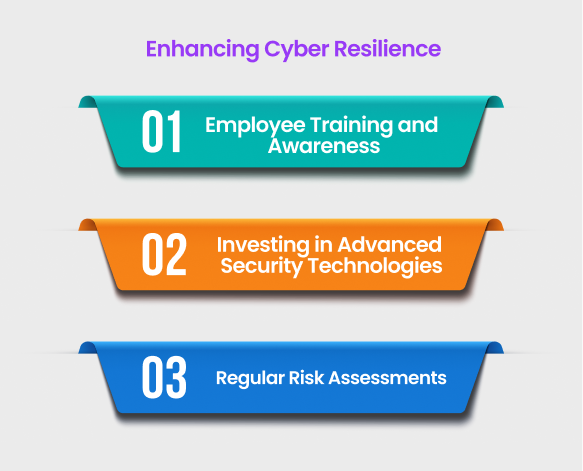
To counteract the growing threat, healthcare organisations are adopting several key strategies:
- Employee Training and Awareness: Given that phishing attacks are a predominant method used by cybercriminals, educating healthcare staff on identifying and responding to these threats is crucial.
- Investing in Advanced Security Technologies: The implementation of state-of-the-art cybersecurity solutions, including endpoint protection, intrusion detection systems, and advanced threat intelligence, is essential for detecting and mitigating cyber threats.
- Regular Risk Assessments: Conducting comprehensive risk assessments helps in identifying vulnerabilities within the healthcare IT ecosystem, enabling organisations to prioritise and address potential weaknesses before they can be exploited.
Moving Forward
The healthcare sector’s journey toward cyber resilience is ongoing. As cybercriminals become more sophisticated, the need for robust cybersecurity measures, paired with comprehensive cyber insurance, becomes increasingly critical. By fostering a culture of security awareness, investing in advanced protective technologies, and ensuring the right insurance coverage, healthcare providers can better protect themselves and their patients from the evolving threats of the digital world.
In this era of digital healthcare, the protection of sensitive patient data is paramount. As healthcare providers continue to navigate the challenging landscape of cybersecurity, the lessons learned from past breaches and the strategies developed in response will be instrumental in shaping a safer, more secure future for patient data.
Mitigata: Your Trusted Partner in Smart Cyber Insurance

Mitigata stands as a beacon in this complex landscape, offering tailored cyber insurance solutions that cater specifically to the healthcare sector’s unique needs. With a deep understanding of the regulatory compliances such as HIPAA, Mitigata provides not just financial protection but also guidance on best practices for data protection.
Their services are designed to bolster healthcare providers’ defences, ensuring that patient data is protected with layered security measures and that organisations are prepared to respond effectively to any incident. As healthcare providers continue to navigate the challenges of cybersecurity, partnering with a specialised insurer like Mitigata can be a decisive step in securing a safer, more secure future for patient data.
Step-by-Step Guide to Filing a Cyber Insurance Claim
Understanding the Cost of Cyber Insurance for Startups
In today’s digital age, startups are at the forefront of innovation, leveraging technology to disrupt industries and drive growth. However, with great opportunity comes great risk, especially in the realm of cybersecurity. As cyber threats continue to evolve and proliferate, startups must navigate the complex landscape of cyber risk management to protect their assets and reputation.
The Growing Threat Landscape for Startups
Cyberattacks against small businesses have been on the rise in recent years, with 46% of all breaches impacting businesses with fewer than 1,000 employees. Despite the common belief that hackers target larger enterprises, smaller companies are increasingly attractive prey for cybercriminals. Social engineering attacks, like phishing, are particularly common among small businesses, who are often perceived as easier targets due to their weaker security measures.
Consider this: 61% of SMBs were targeted by cyberattacks in 2021, with malware accounting for 18% of the attacks. Shockingly, 82% of ransomware attacks targeted companies with fewer than 1,000 employees, and 37% of those hit had fewer than 100 employees.
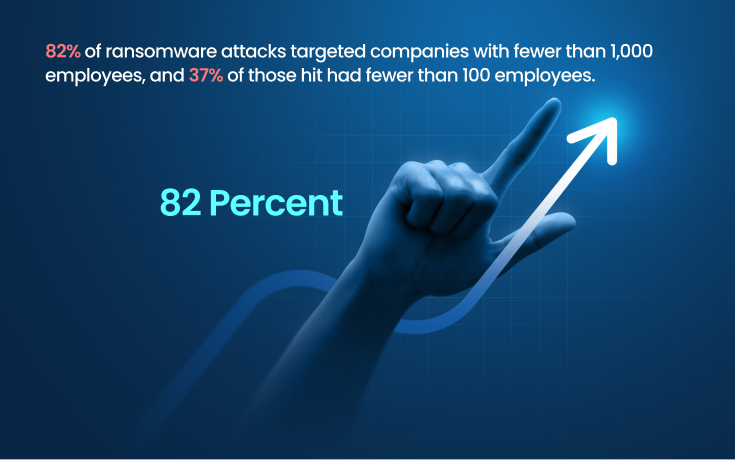
These statistics paint a grim picture of the cyber threat landscape for startups, highlighting the urgent need for robust cybersecurity measures.
The Cost of Cyberattacks for Startups
The consequences of a cyberattack can be devastating for startups, both financially and reputationally. Statistics show that around 60% of small and medium businesses that suffer a cyberattack close down within six months of the incident.
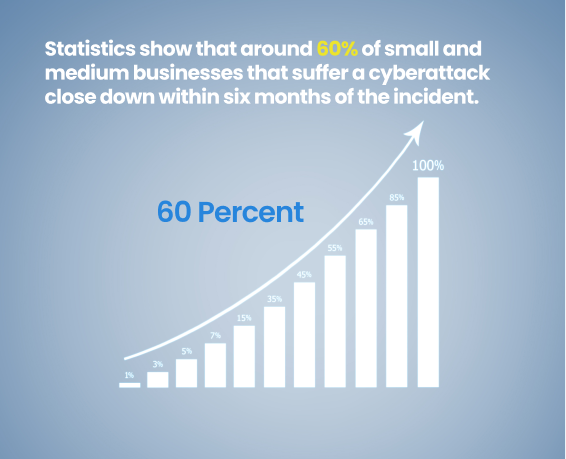
Furthermore, cyberattacks are becoming increasingly frequent, with one occurring every 11 seconds by 2021.
Imagine the scenario: Your startup, fueled by innovation and ambition, falls victim to a ransomware attack. Your critical data is encrypted, and your operations grind to a halt. As you scramble to contain the damage, you’re faced with daunting expenses: legal fees, regulatory fines, customer notifications, and credit monitoring costs. The financial strain is compounded by the damage to your reputation, eroding trust among your clients and partners.
The Role of Cyber Insurance for Startups
Amidst the rising tide of cyber threats, cyber insurance emerges as a lifeline for startups, providing financial protection against the unforeseen costs of cyber incidents. Cyber insurance, also known as cybersecurity insurance or data breach insurance, covers a range of expenses, including:
- Data breach response: Notification costs, credit monitoring, and legal expenses
- Business interruption: Compensation for lost revenue due to cyber incidents
- Ransomware: Coverage for ransom payments and related expenses
- Third-party liability: Protection against lawsuits from affected parties
- Cyber extortion: Coverage for costs related to threats of cyber extortion
- Privacy liability: Addressing claims related to privacy violations
Factors Influencing Cyber Insurance Costs for Startups
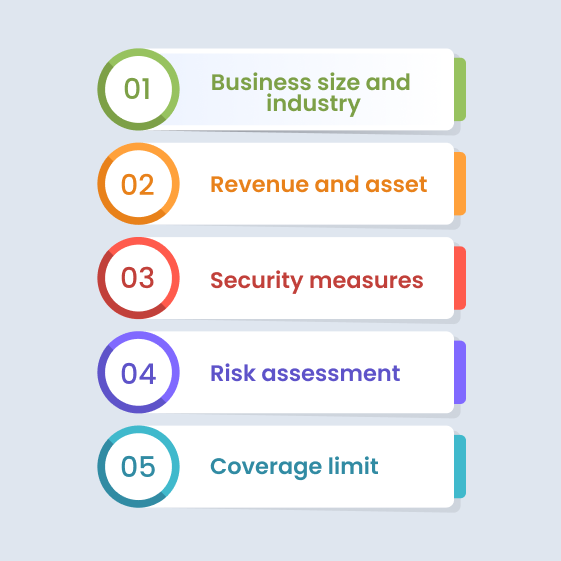
The cost of cyber insurance for startups depends on several factors, including:
- Business size and industry: Startups in high-risk industries may face higher premiums.
- Revenue and assets: Larger companies typically pay more due to their higher exposure.
- Security measures: Strong cybersecurity practices can lead to lower premiums.
- Risk assessment: Startups undergo risk assessments to evaluate their vulnerabilities.
- Coverage limits: Higher limits result in higher premiums.
Last words!

In conclusion, cyber insurance is a vital investment for startups seeking to protect their future in the digital age. By understanding the cost, coverage, and benefits of cyber insurance, startups can safeguard their assets and reputation against the ever-present threat of cybercrime.
Mitigata is here to guide startups through the complexities of cyber insurance and provide tailored solutions to meet their unique needs.
Contact us today to secure your business against cyber risks and ensure long-term success in the digital landscape.
Importance of Cyber Insurance in Data Breach Prevention
Introduction:
In today’s hyperconnected world, data breaches have become a pervasive threat, lurking around every digital corner and targeting businesses of all sizes. The recent data breach at Nissan Oceania, impacting 100,000 individuals, serves as a stark reminder of the devastating consequences of cyberattacks. As we delve into the pivotal role of cyber insurance in mitigating such risks, let’s examine the urgent need for robust cybersecurity measures in light of this alarming breach.
The Growing Threat of Data Breaches:
Recent statistics paint a grim picture of the cybersecurity landscape, underscoring the urgency for businesses to fortify their defences against data breaches:
- Rising Incidence: Data breaches have become alarmingly common, with 61% of SMBs falling victim to cyberattacks in 2021 alone.
- Targeting Small Businesses: Contrary to popular belief, small businesses are not immune to cyber threats. In fact, 46% of all cyber breaches impact businesses with fewer than 1,000 employees.
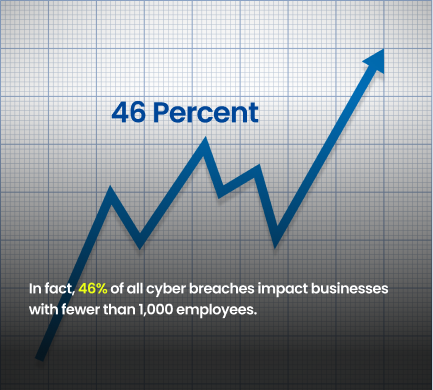
- Increased Sophistication: Cybercriminals are continuously evolving their tactics, leveraging advanced techniques like social engineering and malware to infiltrate business networks and steal sensitive data.
- Financial Fallout: The financial consequences of a data breach can be devastating, with studies showing that around 60% of small and medium businesses that suffer a cyberattack close down within six months of the incident.
The Role of Cyber Insurance:
Amidst the looming spectre of data breaches, cyber insurance emerges as a critical safeguard for businesses, offering financial protection and peace of mind in the face of cyber threats.
Here’s why cyber insurance is indispensable in the realm of data breach prevention:
- Financial Resilience: Cyber insurance serves as a safety net, providing businesses with the financial resources to navigate the aftermath of a data breach. From covering legal expenses and regulatory fines to reimbursing affected parties for damages and credit monitoring, cyber insurance helps mitigate the financial impact of a breach.
- Comprehensive Coverage: A robust cyber insurance policy offers comprehensive coverage tailored to the unique needs and risks of each business. Coverage may include data breach response, business interruption, ransomware protection, third-party liability, and cyber extortion, among other aspects.
- Risk Transfer: By transferring the financial risk of a data breach to the insurer, businesses can effectively manage their exposure to cyber threats. This allows companies to focus on their core operations without being crippled by the financial fallout of a cyberattack.
- Reputation Management: In the aftermath of a data breach, preserving brand reputation is paramount. Cyber insurance not only helps cover the costs of public relations and reputation management but also provides guidance and support to mitigate reputational damage and rebuild trust with stakeholders.
- Regulatory Compliance: With the regulatory landscape evolving rapidly, compliance with data protection laws and regulations is non-negotiable. Cyber insurance helps ensure compliance by covering costs related to regulatory fines and penalties resulting from a data breach.
Conclusion:

In conclusion, the prevalence and severity of data breaches underscore the critical importance of cyber insurance in today’s digital age. As cyber threats continue to evolve and businesses face increasing pressure to protect sensitive information, investing in cyber insurance is not just prudent—it’s essential for long-term viability and resilience.
At Mitigata, we understand the complex challenges businesses face in navigating the cybersecurity landscape. Our tailored cyber insurance solutions offer comprehensive coverage and peace of mind, allowing businesses to focus on growth and innovation without fear of crippling financial losses from data breaches.
Don’t wait until it’s too late—protect your business with cyber insurance and fortify your defences against the ever-present threat of data breaches. Contact us today to learn more about how Mitigata can help safeguard your business’s future in an increasingly digital world.









